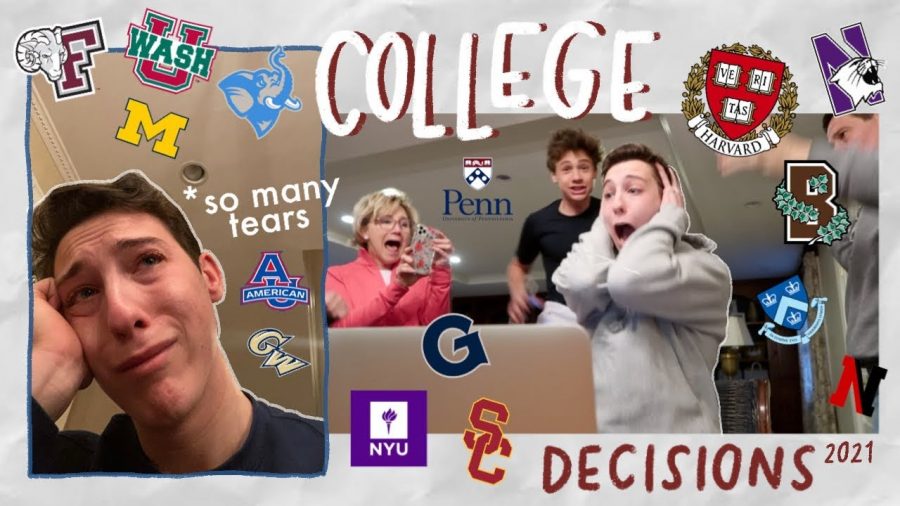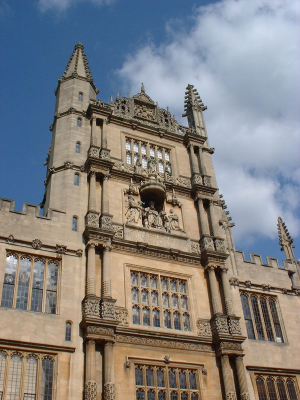Stop idolizing elite colleges
College decision reaction videos capture the emotional responses of high school seniors as they open their college decisions, the majority of which are from highly selective schools. These videos are extremely popular and can garner over a million views, showing how the infatuation with prestige extends far beyond students.
April 30, 2021
As this year’s hectic college admissions season comes to an end, more seniors than ever before are left coping with devastating rejections. The pandemic created uncertainty and allowed for test-optional applications, causing a massive surge in applications for prestigious colleges such as Harvard, which received 43% more applications than last year. Not surprisingly, acceptance rates also plummeted, and Harvard only admitted 3.66% of applicants compared to 4.92% in the previous year.
This dramatic increase in applicants reflects the larger trend of society’s obsession with elite colleges. More and more students are vying for admission to exclusive universities, thinking that the name of their college will influence their entire life.
Not only are students caught up in this obsession, but parents are as well. The 2019 college admissions scandal shed a light on just how far parents were willing to go for a spot at a renowned university. Wealthy families poured up to $6.5 million dollars for fabricated test scores and guaranteed admission for their children as a recruited athlete.
While the actions of those involved in the scandal are inexcusable, there is a much bigger issue at hand besides a few greedy parents. We cannot solely blame them for the scandal, as their actions are a direct result of the society we live in. The majority of us are not guilty of bribing colleges, but we are guilty of romanticizing name-brand schools and creating a system where cheating is inevitable.
Even after the college admissions scandal, many students still go through unethical measures for an acceptance at a highly selective school. In order to gain an edge, some students may resort to cheating or plagiarism. Parents may also push their kids to have a prestige-driven mindset by investing thousands of dollars into college counseling, test preparation classes, and costly summer programs. Although these actions are not illegal, they reinforce the corrupt college admissions system.
The huge emphasis on college prestige leads many students to believe that acceptance into a top college is the epitome of success. We are constantly telling them that their worth hinges on the opinions of often unpredictable admissions officers, rather than their personal accomplishments.
This mindset creates a toxic atmosphere that adds unnecessary stress on high schoolers. At a school like Jefferson, the pressure to gain acceptance into elite universities is even more intense due to the fierce internal competition between classmates. Jefferson is a very college-driven school, and many students have the same primary goal of attending a reputable university. Ultimately, college admission officers compare your application to those from your friends, peers, and teammates, all of which fuel the competitive environment.
Along with stressing out already overwhelmed students, the looming threat of college admissions suppresses student creativity. High school is a time of self-discovery, but many students feel forced to mold themselves to fit the stereotypical Ivy League admit brimming with all A’s, leadership positions, community service, and academic awards. This prevents students from pursuing their own interests, as they may not seem as “impressive” or give the GPA boost that more advanced classes provide.
The idolization of name-brand colleges is also detrimental to prospective students because it ignores every other factor besides prestige. Society often touts highly selective schools as being “the best,” when in reality they are certainly not the strongest in every single field. For example, Princeton, the current No. 1 college in the United States according to U.S News, does not even have a law school.
In addition, elite private colleges often cost much more than other schools. The average tuition of an Ivy League school during the 2020-2021 school year was $56,746, which is more than three times greater than $18,878, the tuition of the University of Virginia for in-state students. Although many top schools offer generous financial aid, students from middle class backgrounds often do not qualify and have to opt for cheaper colleges.
The education quality of a highly ranked college is definitely not three times that of a public state school, yet we still view these colleges as inherently “better.” By idolizing elite universities, we are creating a destructive system that promotes prestige over quality.
Instead of focusing on the results of the college admissions process, we should celebrate every students’ unique journey and encourage them to pursue topics that they are genuinely interested in. We must view college as a single step in the learning process and not as the ultimate goal.
While gaining admittance into a top university is an incredible accomplishment, it should not be the only one that holds value. Where you go to college does not determine who you are or what your future holds. After all, if you peak at 18, then what are you going to do with the rest of your life?


![Students in the Astronomy class participate in a lab activity. "We want to take the fact that our students are going to be competitive and going to want to be excellent and turn that into something that is fun and not stressful and helps everybody succeed," Malcolm Eckel, Challenge Success Staff Representative, said. "[Through] classes that I think are difficult but not stressful, that's the kind of thing that we're going for: having enough student options enough student control that everybody can find their own path to success that feels genuine to them."](https://www.tjtoday.org/wp-content/uploads/2020/11/Screen-Shot-2020-11-23-at-4.49.31-PM-300x201.png)








Ag • Feb 21, 2022 at 10:40 pm
Why should it matter to the quality of an undergraduate school whether the university has a law school?.
Annie Su • Jun 1, 2021 at 11:13 pm
Great article Laura!